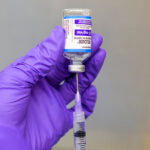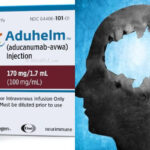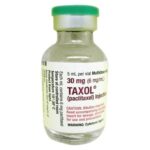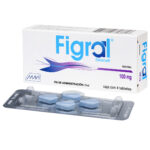Velcade: Uses, Dosage & Side Effects, Mechanism of Action
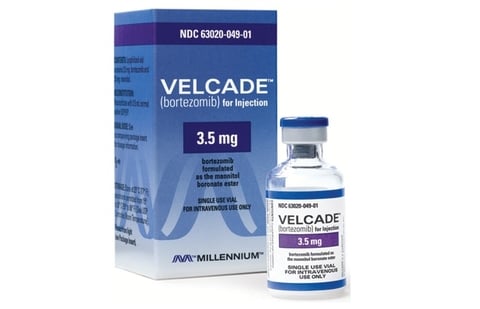
Velcade is a brand of bortezomib, an anti-cancer medication used to treat multiple myeloma and mantle cell lymphoma. This includes multiple myeloma in those who have and have not previously received treatment. It is generally used together with other medications.
Velcade mechanism of action
Bortezomib is in a class of medications called antineoplastic agents. It works by killing cancer cells. Bortezomib works to target the ubiquitin-proteasome pathway, an essential molecular pathway that regulates intracellular concentrations of proteins and promotes protein degradation. The ubiquitin-proteasome pathway is often dysregulated in pathological conditions, leading to aberrant pathway signalling and the formation of malignant cells. In one study, patient-derived chronic lymphocytic leukemia (CLL) cells contained 3-fold higher levels of chymotrypsin-like proteasome activity than normal lymphocytes.
By reversibly inhibiting proteasome, bortezomib prevents proteasome-mediated proteolysis. Bortezomib exerts a cytotoxic effect on various cancer cell types in vitro and delays tumour growth in vivo in nonclinical tumour models. Bortezomib inhibits the proteasome activity in a dose-dependent manner. In one pharmacodynamic study, more than 75% of proteasome inhibition was observed in whole blood samples within one hour after dosing of bortezomib.
Before using Velcade:
• tell your doctor and healthcare provider if you are allergic to Velcade, mannitol, any other medications, boron, or any of the ingredients in Velcade. Ask your healthcare provider for a list of the ingredients.
• tell your doctor and pharmacist what other prescription and nonprescription medications, vitamins, or nutritional supplements you are taking or plan to take. Be sure to mention any of the following: clarithromycin (Biaxin, in PrevPac); certain antifungals such as itraconazole (Sporanox) or ketoconazole (Nizoral); idelalisib (Zydelig); medications to treat diabetes or high blood pressure; certain medications to treat human immunodeficiency virus (HIV) or acquired immunodeficiency syndrome (AIDS) such as indinavir (Crixivan), nelfinavir (Viracept), ritonavir (Norvir), or saquinavir (Invirase); certain medications to treat seizures such as carbamazepine (Carbatrol, Tegretol), phenobarbital (Luminal, Solfoton), or phenytoin (Dilantin, Phenytek); nefazodone; ribociclib (Kisqali, Kisqali, in Femera); rifabutin (Mycobutin); or rifampin (Rifadin, Rifamate, Rimactane, others). Your doctor may need to change the doses of your medications or monitor you carefully for side effects. Many other medications may also interact with Velcade, so be sure to tell your doctor about all the medications you are taking, even those that do not appear on this list.
• tell your doctor what herbal products you are taking, especially St. John’s wort.
• tell your doctor if you or anyone in your family has or has ever had heart disease and if you have or have ever had a herpes infection (cold sores, shingles, or genital sores); diabetes; fainting; high cholesterol (fats in the blood); low or high blood pressure; peripheral neuropathy (numbness, pain, tingling, or burning feeling in the feet or hands) or weakness or loss of feeling or reflexes in a part of your body;or kidney or liver disease. Also tell your doctor if you smoke or drink large amounts of alcohol.
• tell your doctor if you are pregnant or plan to become pregnant. Velcade may harm the fetus. Use birth control to prevent pregnancy during your treatment with Velcade and for at least 7 months after your final dose. If you are a male with a female partner who could become pregnant, be sure to use birth control during your treatment with Velcade and for at least 4 months after your final dose. Ask your doctor if you have questions about types of birth control that will work for you. If you or your partner become pregnant while using Velcade or for 7 months after your final dose, call your doctor immediately.
• do not breastfeed during your treatment with Velcade and for 2 months after your final dose.
• if you are having surgery, including dental surgery, tell the doctor or dentist that you are using Velcade.
• you should know that Velcade may make you drowsy, dizzy, or lightheaded, or cause fainting or blurred vision. Do not drive a car or operate machinery or dangerous tools until you know how this medication affects you.
• you should know that Velcade may cause dizziness, lightheadedness, and fainting when you get up too quickly from a lying position. This is more common in people who have fainted in the past, people who are dehydrated, and people who are taking medications that lower blood pressure. To avoid this problem, get out of bed slowly, resting your feet on the floor for a few minutes before standing up.
How should Velcade be used?
Bortezomib comes as a solution (liquid) to inject into a vein or subcutaneously (under the skin). Velcade is given by a doctor or nurse in a medical office or clinic. Your dosing schedule will depend on the condition that you have, the other medications you are using, and how well your body responds to treatment.
Be sure to tell your doctor how you are feeling during your treatment. Your doctor may stop your treatment for a while or decrease your dose of Velcade if you experience side effects of the medication.
Ask your pharmacist or doctor for a copy of the manufacturer’s information for the patient.
Other uses for this medicine
This medication may be prescribed for other uses; ask your doctor or pharmacist for more information.
What special dietary instructions should I follow?
Talk to your doctor about eating grapefruit and drinking grapefruit juice while using this medication.
Drink plenty of fluids every day during your treatment with Velcade, especially if you vomit or have diarrhea.
What should I do if I forget a dose?
If you miss an appointment to receive a dose of Velcade, call your doctor right away.
What side effects can this medication cause?
Velcade may cause side effects. Tell your doctor if any of these symptoms:
• general weakness
• tiredness
• nausea
• vomiting
• diarrhea
• constipation
• loss of appetite
• stomach pain
• headache
• pain, redness, bruising, bleeding, or hardness at injection site
• difficulty falling asleep or staying asleep
Some side effects can be serious. If you experience any of these symptoms, call your doctor immediately:
• weakness in the arms or legs, changes in the sense of touch, or pain, burning, numbness, or tingling in the hands, arms, legs, or feet
• sudden shooting or stabbing pain, constant aching or burning pain, or muscle weakness
• shortness of breath, fast heartbeat, headache, dizziness, pale skin, confusion, or tiredness
• swelling of the feet, ankles, or lower legs
• hives, rash, itching
• hoarseness, difficulty swallowing or breathing, or swelling of the face, throat, tongue, lips, eyes, or hands
• fever, sore throat, chills, cough or other signs of infection
• unusual bruising or bleeding
• black and tarry stools, red blood in stools, bloody vomit, or vomiting material that looks like coffee grounds
• slurred speech or inability to speak or understand speech, confusion, paralysis (loss of ability to move a part of the body), vision changes, or loss of vision, balance, coordination, memory or consciousness
• fainting, blurred vision, dizziness, nausea, or muscle cramps
• chest pressure or pain, fast heartbeat, swelling of the ankles or feet, or shortness of breath
• cough, shortness of breath, wheezing, or difficulty breathing
• headache, confusion, seizures, tiredness, or vision loss or changes
• pinpoint-sized purple dots under the skin, fever, tiredness, dizziness, shortness of breath, bruising, confusion, sleepiness, seizures, decreased urination, blood in the urine, or swelling in legs
• fever, headache, chills, nausea, pain, itching or tingling followed by a rash in the same area with skin blisters that are itchy or painful
• nausea, extreme tiredness, unusual bleeding or bruising, lack of energy, loss of appetite, pain in the upper right part of the stomach, yellowing of the skin or eyes, or flu-like symptoms
Velcade may cause other side effects. Call your doctor if you have any unusual problems while receiving this medication.
What should I know about storage and disposal of this medication?
Velcade will be stored in the medical office or clinic.
In case of emergency/overdose
In case of overdose, call the poison control helpline at 1-800-222-1222. Information is also available online at https://www.poisonhelp.org/help. If the victim has collapsed, had a seizure, has trouble breathing, or can’t be awakened, immediately call emergency services at 911.
Symptoms of overdose may include the following:
• fainting
• dizziness
• blurred vision
• unusual bruising or bleeding
Velcade safety Information
Velcade may cause a serious viral infection of the brain that can lead to disability or death. Call your doctor right away if you have any change in your mental state, decreased vision, or problems with speech or walking. These symptoms may start gradually and get worse quickly.
Velcade can lower blood cells that help your body fight infections and help your blood to clot. You may get an infection or bleed more easily. Call your doctor if you have unusual bruising or bleeding, or signs of infection (fever, chills, body aches).
Keep all appointments with your doctor and the laboratory. Your doctor will order certain lab tests to check your body’s response to Velcade.
It is important for you to keep a written list of all of the prescription and nonprescription (over-the-counter) medicines you are taking, as well as any products such as vitamins, minerals, or other dietary supplements. You should bring this list with you each time you visit a doctor or if you are admitted to a hospital. It is also important information to carry with you in case of emergencies.

